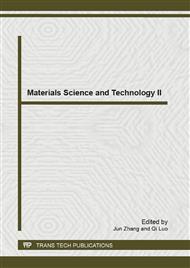p.296
p.304
p.310
p.314
p.320
p.325
p.328
p.332
p.337
Effects of Impulse Current on Plastic Behavior of 2A12 and 7A04 Aluminum Alloys
Abstract:
Hard aluminum 2A12 and super hard aluminum 7A04 were adopted to conduct tensile tests in different conditions of impulse current. Effects of current density on elongationtensile strength and hardness were analyzed. In this experiment, thermal effect that impulse current exerted on aluminum alloy had little impact to plasticity. After adding impulse current, the elongation of aluminum alloy increased, but the tensile strength and hardness decreased. The elongation of the hard aluminum 2A12 could increase 53.4% and the elongation of the super hard aluminum 7A04 could increase 69.5% in certain condition.
Info:
Periodical:
Pages:
320-324
DOI:
Citation:
Online since:
July 2013
Authors:
Keywords:
Price:
Сopyright:
© 2013 Trans Tech Publications Ltd. All Rights Reserved
Share:
Citation:


